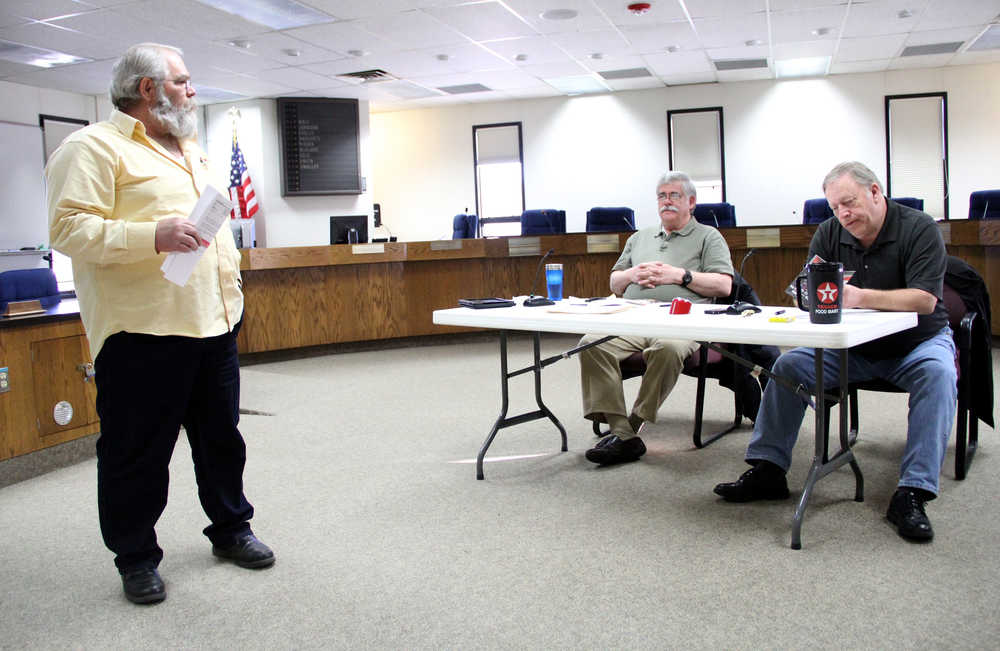Local representatives listened to central Kenai Peninsula residents’ concerns and comments about various state and peninsula issues at a town hall meeting Saturday.
About one dozen people stopped by the meeting at the George A. Navarre Borough Administration Building in Soldotna where Reps. Kurt Olson, R-Kenai, and House Speaker Mike Chenault, R-Nikiski, heard public comment that focused on the fishing and energy industries.
Robert Ruffner, with the Kenai Watershed Forum, Brian Gabriel Sr., Kenai city council member and commercial fisherman, and Megan Smith, a Cook Inlet setnetter, all testified to the representatives about their disappointment with the Board of Fish and the meeting process.
Ruffner said while the Kenai Peninsula Borough is doing well in its efforts, the State of Alaska is failing the central peninsula with king salmon habitat preservation.
“I think we’re going to lose those fish if we don’t have some pretty extraordinary measures,” he said.
Chenault said he’s also frustrated by the process and with no attempt to protect habitat, other species will start depleting as well.
Gabriel said the structure of the meeting was problematic and items concerning habitat should have been on the forefront of the agenda.
This year’s meeting was the first Smith attended. She was part of the public use committee and she thought the group had generated a lot of good ideas, but at the meeting they “got slaughtered.”
She wants to know how to fix a process and board that’s broken.
Olson agreed and said the fish board definitely isn’t working.
Chenault said he’s been toying with the idea of a professional board and he thinks that’s the only way to get anywhere. He said he wishes biologists were making more decisions.
Mike Munger, Cook Inlet Regional Citizens Advisory Council executive director, spoke to the representatives about the Department of Environmental Conservation’s Spill Prevention and Response Division fund.
The division’s operations rely on hydrocarbon production receiving funds via a nickel-per-barrel tax. Due to inflation, decreased oil through the pipeline and funds diverted to other programs like contaminated site cleanups, the division could face a funding shortfall within a few years, according to the council’s website.
Munger said for the agency to adequately respond to situations, it needs money.
Chenault agreed funding for the agency needs to be ensured whether by increasing the tax per barrel by another nickel or finding a different solution.
A project Munger said makes good sense in Cook Inlet is the Tesoro and Cook Inlet Energy subsea pipeline crossing the body of water. In a previous Clarion interview, Jerry Romback, CIRCAC director of administration said the proposed 29-mile pipeline is a safer method of transporting oil across the inlet than by tanker.
Nikiski resident William “Bill” Warren also addressed energy industry related concerns.
He said he’s worried about ExxonMobil’s role in the Alaska Pipeline Project and would like to see the Alaska Gasline Development Corporation take over all gas projects.
Chenault said he has concerns about the project moving forward and how AGDC will fit in and the legislation is working with administration to make sure AGDC is part of the project.
Warren said he thinks the state is in a “full-blown emergency” and wants to see interim gas needs addressed.
While permitting for the pipeline project could take two to three years, Chenault said that the industry is very active in the inlet with recent investments and new technology to explore and open old wells.
Olson said with Hillcorp making commitments to fulfill gas needs with local utilities into 2018, he has no doubt it has the ability to meet those contracts.
Kaylee Osowski can be reached at kaylee.osowski@peninsulaclarion.com.

